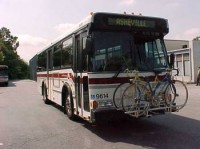The city of Asheville plans to solicit proposals from new companies to manage its transit system.
“We’re developing a Request for Proposal (RFP) and we’re hoping to have it ready to go to invite proposals beginning in June,” reports City Manager Gary Jackson.
The City’s transit infrastructure is currently being managed by First Transit, Inc. The Cincinnati-based company was awarded a three-year contract in 2008 with a two-year extension option. The city pays First Transit about $130,000 a year to perform duties that include maintaining vehicles and hiring and supervising drivers.
Asheville is required by law to use a management company for day-to-day transit operations. This is because cities in North Carolina are forbidden to negotiate directly with unions, and Asheville Transit’s drivers are members of the Amalgamated Transit Union.
The relationship between First Transit and union workers has reportedly been tense, and the company has been the subject of criticism for its safety record. Last winter the city completed a safety audit and plans to incorporate additional safety measures into any new contract, says Jackson.
“We’re going to insert some structural changes in the contract to implement some of the safety audit findings that came back to us this winter,” he explains. “[The audit] offered some suggestions and we’re going to make sure that we have management plans aligned with those. And accountability for implementing those audit decisions.”
The RFP takes the city’s plans to roll out the first wave of reforms called for in its Transit Master Plan “to the next level,” adds Jackson. “It’s part of our ongoing effort to get the very best transit system we can get for our money.”
Starting in June, the Asheville Transit System will implement changes designed to improve its routing and on-time performance. The city will also mount a marketing campaign to increase ridership, changing the name of the system from ATS to ART (Asheville Redefines Transit).
Jackson assures residents that picking the next management company won’t be a “political process,” stressing that “it’s a merit based decision.”




Take it public and hire a manager. Stop feeding private companies public money.
I’m looking forward to seeing where this goes!
I *shudder* agree with Mat. Either leave it to private hands (what I’d prefer) or make it fully public. Giving a private company special privileges is the worst of both worlds.
I’m not against private/public partnerships…..but those private entities receiving public dollars need oversight. If the Public side of the equation cannot do proper oversight (which looks like the case in many instances here in Asheville), then they should avoid making deals with the peoples trust/monies.
I just caught this bit in the story: [b]This is because cities in North Carolina are forbidden to negotiate directly with unions…[/b]
Seriously? What’s that all about? How about a tiny story on that, please?
Yes, “forbidden” is a mighty strong word. What’s that all about?????
Found it. This goes back to 1958, apparently, and an attempt to unionize the Charlotte PD.
Currently, NCGS Section 95-98 (I won’t take a chance that this forum would correctly interpret the HTML for that funny squiggle shape) states:
“Any agreement, or contract, between the governing authority of any city, town, county, or other municipality, or between any agency, unit, or instrumentality thereof, or between any agency, instrumentality, or institution of the State of North Carolina, and any labor union, trade union, or labor organization, as bargaining agent for any public employees of such city, town, county or other municipality, or agency or instrumentality of government, is hereby declared to be against the public policy of the State, illegal, unlawful, void and of no effect.”
So, wow, there’s that.
I’m curious about the marketing campaign. I’m a recent marketing graduate and I’d love to help with a project like this. :)
North Carolina’s “Right to Work” laws, passed after the 1947 Taft-Hartley Act, explain why the city can’t sign a union contract with the bus drivers, but an explanation is still needed as to why the city is required (?) to use unionized drivers, rather than non-union city employees. Could Mr. Frankel explain?
The implication here is that the city does not manage the union drivers, but pays their salaries.That seems to be having contact with them.
$130,000 a year for maintenance and management sound like pretty good deal compared with some of the other local government expenditures. Isn’t that close to gas money for the county commissioners?
The implication here is that the city does not manage the union drivers, but pays their salaries.That seems to be having contact with them.
$130,000 a year for maintenance and management sound like pretty good deal compared with some of the other local government expenditures. Isn’t that close to gas money for the county commissioners?
I don’t see that there is a requirement to use union drivers, only that the city not be directly involved with them. It’s kind of like all those Republicans who hire “contractors” to manage their “lawns” and then feign innocence when those contractors are caught hiring illegals.
Anyway, it seems to me that $130,000 is actually a pretty low figure. What might be more interesting is knowing how much the transit company makes in the deal.